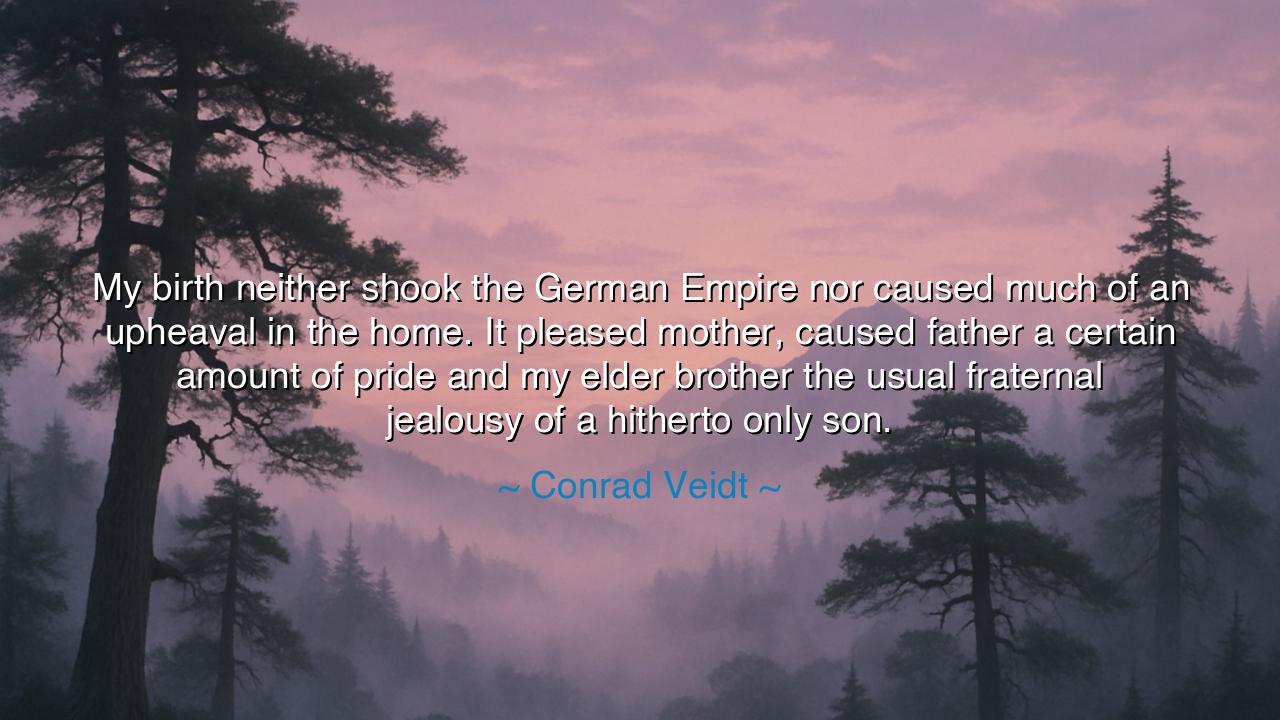
My birth neither shook the German Empire nor caused much of an
My birth neither shook the German Empire nor caused much of an upheaval in the home. It pleased mother, caused father a certain amount of pride and my elder brother the usual fraternal jealousy of a hitherto only son.






There is humility, wit, and deep self-awareness in the words of Conrad Veidt, when he wrote: “My birth neither shook the German Empire nor caused much of an upheaval in the home. It pleased mother, caused father a certain amount of pride and my elder brother the usual fraternal jealousy of a hitherto only son.” Within this seemingly simple reflection lies a profound meditation on the nature of human beginnings — on how most lives, even those destined for greatness, begin in quiet ordinariness. Veidt, the famed German actor who would one day captivate the world through both silent and sound cinema, looked back upon his birth not with grandeur but with irony and humility. His words remind us that history does not announce its heroes at birth; they emerge, slowly, through struggle, choice, and time.
Born in 1893 in Berlin, Conrad Veidt would grow to embody the complex spirit of his age — a man of great artistic power, who lived through the rise and fall of empires, through the tremors of war, and through exile from his homeland. Yet in recalling his beginnings, he stripped away all pomp and illusion. He described his arrival into the world as an event of no cosmic importance — one that stirred no kingdoms, summoned no angels, and shook no thrones. Instead, it was an intimate, domestic moment: a mother’s joy, a father’s pride, a brother’s jealousy. This is the essence of Veidt’s wit — the reminder that the drama of life begins not on the stage of nations, but in the simple theater of the home.
And yet, behind this humor lies a subtle commentary on human vanity. In every age, men seek to make their births seem fateful, as if destiny had chosen them from the cradle. Kings and conquerors weave legends around their origins; poets and prophets are said to have been heralded by signs. But Veidt rejects this mythology. He understands that greatness does not arrive with birth, but with becoming. No one is born a hero, an artist, or a saint — these identities are carved from the long labor of life. His remark, though gentle, carries the same timeless truth found in the sayings of the ancients: that the mighty oak once slept as an unnoticed acorn in the soil.
The mention of his brother’s “fraternal jealousy” gives his reflection both warmth and realism. It reminds us that jealousy, even in its innocent form, is among the first emotions that greet us in this world. His brother, once the sole light of attention, felt the shadow of rivalry fall across him. In this small domestic moment, we glimpse one of humanity’s oldest truths — that every life, by its mere presence, disturbs the balance of another. Jealousy is born alongside love, competition alongside kinship. Yet Veidt treats it not as bitterness, but as the natural comedy of existence. It is as if he says, “This, too, is life — full of pride, affection, and envy, all mingled in the same fragile household.”
History has shown that Veidt’s modesty at birth belied the impact of his later life. His performances in films such as The Cabinet of Dr. Caligari and Casablanca revealed an artistry that transcended borders. He defied tyranny during the rise of Nazism, openly opposing the regime and fleeing Germany rather than compromise his principles. In this sense, the man who claimed his birth “neither shook the Empire” would later become one of its quiet moral challengers — not through war or politics, but through courage and integrity. His humility at the beginning stands in poetic contrast to the grandeur of his legacy.
The wisdom of Veidt’s quote lies in its quiet acceptance of human smallness. It is a reminder that not every birth must be accompanied by prophecy, and that ordinary beginnings often conceal extraordinary destinies. The newborn who enters the world without fanfare may one day shape it in silence. We are not defined by the noise that greets our arrival, but by the echoes we leave behind. The wise take comfort in this — that greatness does not depend on circumstance, but on the cultivation of the heart and the steadfastness of one’s deeds.
Let this be the lesson drawn from Conrad Veidt’s reflection: be humble in origin, patient in growth, and steadfast in purpose. Do not seek to be born great, but to live greatly. Remember that all who ever achieved beauty, honor, or truth began as infants in quiet rooms, greeted by nothing grander than a parent’s smile and a sibling’s jealousy. For the world is not changed by those born amidst thunder, but by those who rise from silence and give their lives to meaning. And so, like Veidt, one may look back one day and say with both humility and pride: “My birth shook no empires — but my life, perhaps, stirred a few souls.”






AAdministratorAdministrator
Welcome, honored guests. Please leave a comment, we will respond soon